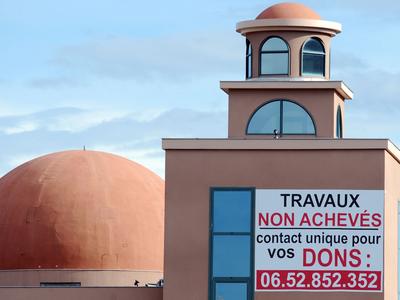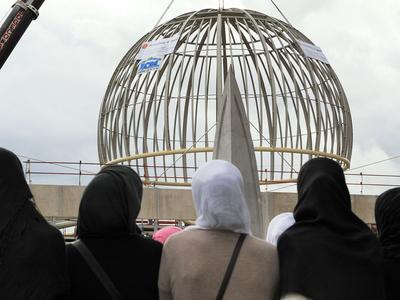Who finances the construction of these buildings? Who are these foreign investors? How much is the construction of a mosque? . Responses elements
This is a sea serpent A question that often stirred the political class. The financing of mosques in France. In the weekend, Prime Minister Manuel Valls presented the topic on the table. In an interview with World , the head of government expressed support for a temporary ban on foreign funding for the construction of mosques. An ad that raises many questions. But supporting the construction of these buildings? Who are these foreign investors? How much is the construction of a mosque? answers.
1- How mosques constructions are funded?
There are few reliable and transparent information about it. “Today we do not know from where the sources of funding, or the amounts given,” says UDI Senator Hervé Maurey which published a report on the subject last year. The 1905 law prohibiting the public funding of religion in France, the projects are mainly financed by the faithful via quests, the most important moment is the period of Ramadan, as pointed out by Senator Nathalie Goulet IDUs in another report released early July. Other Muslim organizations and places of worship may also provide support. But few associations that manage to raise all the money to start the work. Consequently, they often look for sponsors abroad.
2 – Can help build town halls?
Also according to the 1905 law, local authorities do not have the right to subsidize the construction of a building worship or operation. However, case law allows them to finance the Cultural of those mosques (library, classroom, restaurant, etc). They can also provide loan guarantees or make available municipal premises. Finally, they can also use a “long lease” means a lease of very long duration in exchange for a modest rent.
3 – Who collects the money?
Generally, these are Muslim associations. “Independent groups that have a place of prayer but wish to build a mosque,” says Alexander Piettre, a sociologist and expert on Islam. “Either they are 1901-type associations, or worship.” The disadvantage: they are not required to make their accounts public. Another problem donations they collect are untraceable, the latter being mostly manually, in cash.
4 – Who are these foreign investors?
They may come from Europe, but they are often donors from countries like Algeria, Morocco, Qatar, the United Arab Emirates or Saudi Arabia. “These donations can both come from wealthy private individuals (businessmen, religious) or the states themselves,” adds Alexander Piettre, post-doctoral researcher at Group Companies, Religions, Laïcités (GRSL) at the School Pratique des Hautes Etudes and the CNRS.
When asked by Senator Nathalie Goulet, several foreign states * have agreed to disclose the amounts they had paid for the French mosques. In the image of Saudi Arabia, which since 2011, has disbursed more than $ 3.7 million to fund the construction of eight mosques on French territory. However, impossible to control private donations. “But they are, without doubt, those who arouse in public opinion, the more suspicion, about the ideological orientation that drives them,” says Nathalie Goulet’s report.
” in the years 1980-1990, the first large mosques were fully financed by foreign funds, “reported the sociologist Alexander Piettre. He cites for example the mosques of Mantes-la-Jolie and Lyon: “For the Evry, the frame was financed by funds from the Gulf countries and decoration, by Morocco,” he recalls. “But today, more Muslim organizations seek to be autonomous,” he insists. This would be the case in Grigny, in the Essonne, where the mosque is financed by the savings of the Muslim community. The imam said Brahim Agouram L’Opinion he did not want foreign financing.

In 2013, a panel called the faithful to send donations to fund the completion of a mosque in Toulouse Photo credit:. PASCAL PAVANI / AFP
5 – What is the share of foreign funding in the buildings?
Again, there are no precise figures on the subject. “About 10% of the projects of foreign funding,” said Thomas Andrieu early 2016, Director of Civil Liberties and Legal Affairs of the Ministry of Interior, asked about the Senate. But this remains an unsubstantiated estimate.
6 – How many projects of Muslim places of worship are under way?
There would be several hundred, says sociologist Alexander Piettre. 410, if you believe a statement made at the April 5 by the newspaper mosques in France. Last year Libération quoted the figure of 350. There were 200 in 2012, from Le Monde. Some places are already in the works, others are at an earlier stage (land purchase, planning permission, etc).
7 – How much is the construction of a mosque?
It depends on the nature of the project and its size. The construction of a mosque can range from several hundred thousand to several million. Thus, the cost of building the great mosque of Marseilles amounted to EUR 22 million when one of Tulle (Corrèze) would be 350,000 euros.
8 – How long to build a mosque?
Generally, the implementation of these projects takes time. The time to raise money to start construction, the time to reach agreement with the city to find a place to build. Besides the legal battles between municipalities and associations that may delay the work and the entry into the premises. In Grigny, collecting money from the faithful began in 2003. … “And we came to EUR 1.5 million after ten years,” says L’Opinion Imam Agouram Brahim, president of the Union of Muslims of Grigny (UMG). It was the sum necessary to start work, he says. The total cost of the building of 1100 m² is expected to rise to 4.5 million.

Construction of the Strasbourg Mosque in 2009 Copyright: FREDERICK FLORIN / AFP
9 – Why this lack of transparency is problematic
Senator Hervé Maurey, it is essential to know the sources of financing of places of worship. “When a situation is opaque, one can imagine a lot. One may think that the investor will have an influence on the functioning of the mosque imams and sermons. ” What creating tensions among some politicians. In Nice, for example, the Deputy Mayor Christian Estrosi opposes the construction of a mosque, owned by the Saudi Minister of Islamic Affairs Sheikh Saleh bin Abdul Aziz Al-Sheikh. “It is therefore important to know if the doubts that we are founded or not,” says the Senator UDI. “Tracfin (the body that fight against money laundering, nldr) was still required to investigate suspicious funding of Muslim places of worship,” he wants to remember. The lack of transparency around the use of these funds may also be problematic. In October 2014, the rector of the Mosque of Mohamed Nanterre Boudjedi was sentenced to three years in prison, half of which were suspended, for embezzling over 530,000 euros for the construction of the new church.
10 – How to make these more transparent funding?
In his report, Senator Hervé Maurey recommended that the financing plans are made public and that they are validated by the auditors. A track that the Interior Ministry had considered interesting. In January, the Director of Civil Liberties and Legal Affairs said work on. “Especially for the constitutionality of advertising associations of accounts”, said Thomas Andrieu. “But since then, nothing,” sighs Hervé Maurey.
The senator also shows very critical of the proposal of Manuel Valls. “A temporary ban, what does that mean? Before forbid, we should first know the extent and reality of its financing! “He also rejects the option chosen by the Austrians that prohibits foreign funding in places of worship. The UDI Senator Nathalie Goulet sees what the head of government “double imposture.” “These words from the assumption that the radicalization comes mosques, which is not true. As for financing from abroad, it is not a majority, but important: how do without? Is the taxpayer who will replace them? It would be a violation of secularism, “said the parliamentarian, told AFP.
* Turkey, Morocco, Algeria and Saudi Arabia
No comments:
Post a Comment